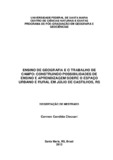| dc.creator | Cioccari, Carmen Candida | |
| dc.date.accessioned | 2014-09-12 | |
| dc.date.available | 2014-09-12 | |
| dc.date.issued | 2013-07-26 | |
| dc.identifier.citation | CIOCCARI, Carmen Candida. Teachingof geography andfieldwork: building opportunities teaching urban space and countrified in Júlio de Castilhos, RS. 2013. 93 f. Dissertação (Mestrado em Geociências) - Universidade Federal de Santa Maria, Santa Maria, 2013. | por |
| dc.identifier.uri | http://repositorio.ufsm.br/handle/1/9383 | |
| dc.description.abstract | The research is related to the use of instruments, methodologies and tools for learning the pedagogical practices of the discipline of geography. The problematic of this research is to analyze critically, in order to understand it, how the geography lessons are developed, in the context of learning in the public school.The problem derived from the following questions: What is the importance of field work for geography lessons? According to the inductive and deductive methods, what is the role of the field work in the composition of geographic knowledge? Does the participation and interaction of students, in a formative process, contribute to the development of the knowledge construction in geography lessons? The overall objective of this article is to evaluate the different perspectives used in the practice of field work as a guiding foundation of learning geography in elementary school. The methodology to be developed in this research focuses on field work present as a background in geographic education, since it has variables in learning activities, contextualized in environments that are not formal, where students will come in contact with objects and real situations, related to the daily life and, at the same time, with the scientificity of contents of proposed studies.The fieldwork was conducted in two environments and divided into two parts, the first part was developed in the urban environment using the deductive method and the second, in a rural setting with the use of the inductive method. The results obtained were different in the sense of knowledge construction, but both were successful. | eng |
| dc.format | application/pdf | por |
| dc.language | por | por |
| dc.publisher | Universidade Federal de Santa Maria | por |
| dc.rights | Acesso Aberto | por |
| dc.subject | Trabalho de campo | por |
| dc.subject | Geografia | por |
| dc.subject | Alunos/educandos | por |
| dc.subject | Construção do conhecimento | por |
| dc.subject | Field work | eng |
| dc.subject | Geography | eng |
| dc.subject | Pupils/students | eng |
| dc.subject | Knowledge construction | eng |
| dc.title | Ensino de geografia e o trabalho de campo: construindo possibilidades de ensino e aprendizagem sobre o espaço urbano e rural em Júlio de Castilhos, RS | por |
| dc.title.alternative | Teachingof geography andfieldwork: building opportunities teaching urban space and countrified in Júlio de Castilhos, RS | eng |
| dc.type | Dissertação | por |
| dc.description.resumo | A pesquisa está relacionada aos usos de instrumentos, metodologias e ferramentas de aprendizagem, nas práticas pedagógicas da disciplina de Geografia. A problemática desta pesquisa consiste em analisar criticamente, a fim de compreender, como são desenvolvidas as aulas de Geografia, no contexto do aprendizado de umaescola pública. Do problema derivaram as seguintes questões: Qual a importância do trabalho de campo para as aulas de Geografia? De acordo com os métodos indutivo e dedutivo, qual o papel do trabalho de campo na composição do conhecimento geográfico? A participação e interação dos alunos, num processo formativo contribuem para o desenvolvimento da construção do conhecimento nas aulas de Geografia? O objetivo geral desta pesquisa visa avaliar as diferentes perspectivas utilizadas na prática de pesquisa e produzir um arcabouço teórico-metodológico sobre o trabalho de campo como fundamento norteador da aprendizagem de Geografia no ensino fundamental. A metodologia desenvolvida nesta pesquisa centra-se no trabalho de campo apresentado como fundamento norteador à aprendizagem geográfica na educação, uma vez que ela apresenta variáveis nas atividades de aprendizagem, contextualizada em ambientes não formais, onde os alunos poderão fazer contato com objetos e situações reais, relacionadas com o cotidiano e ao mesmo tempo com a cientificidade do conteúdo de estudos propostos. O trabalho de campo foi realizado em dois ambientes e dividido em duas partes, sendo a primeira desenvolvida em ambiente urbano pelo método dedutivo e a segunda, em ambiente rural com o uso do método indutivo. Os resultados obtidos foram diferentes, no sentido da construção do conhecimento, mas ambos foram realizados com sucesso. | por |
| dc.contributor.advisor1 | Costa, Benhur Pinós da | |
| dc.contributor.advisor1Lattes | http://lattes.cnpq.br/6758952717155318 | por |
| dc.contributor.referee1 | Nogueira, Amélia Regina Batista | |
| dc.contributor.referee1Lattes | http://lattes.cnpq.br/8136324837437755 | por |
| dc.contributor.referee2 | Werlang, Mauro Kumpfer | |
| dc.contributor.referee2Lattes | http://lattes.cnpq.br/1378915947547752 | por |
| dc.creator.Lattes | http://lattes.cnpq.br/4626587353715879 | por |
| dc.publisher.country | BR | por |
| dc.publisher.department | Geografia | por |
| dc.publisher.initials | UFSM | por |
| dc.publisher.program | Programa de Pós-Graduação em Geografia | por |
| dc.subject.cnpq | CNPQ::CIENCIAS HUMANAS::GEOGRAFIA | por |


